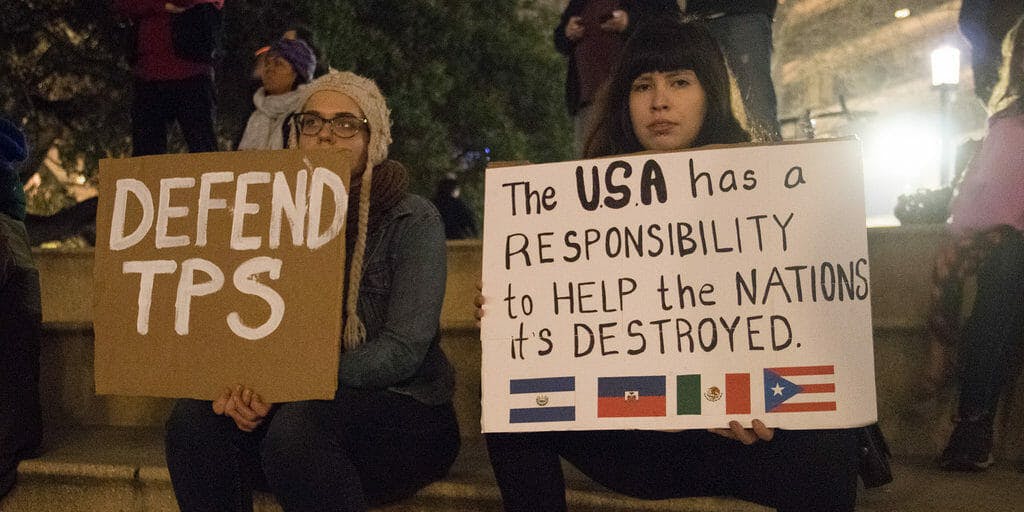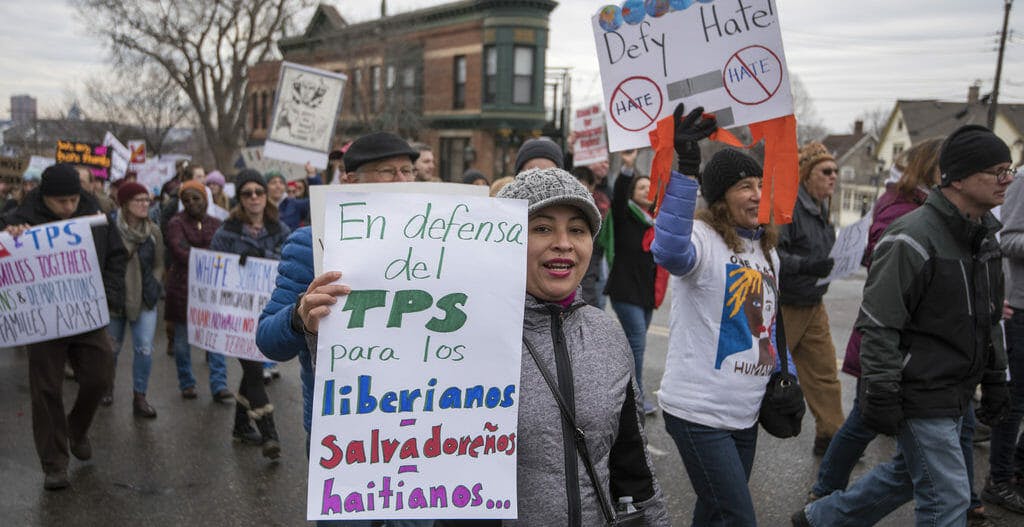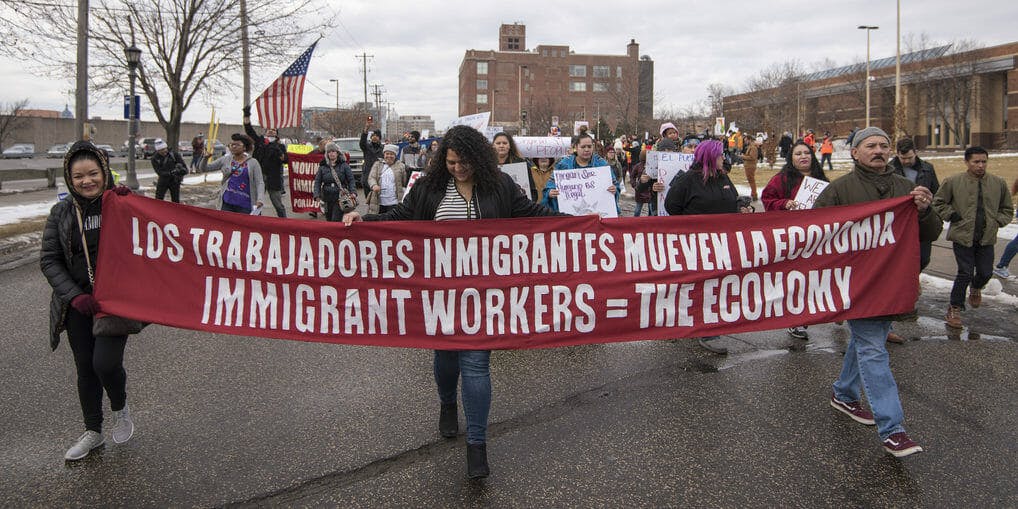Eight days into the new year, the Trump administration announced that 200,000 Salvadorans legally living and working in the United States would be forced to leave the country—or, less easily, adjust their legal status—by Sept. 9, 2019. The announcement, made by Kristjen Nielsen, secretary of the Department of Homeland Security (DHS), came in light of a review of El Salvador’s disaster-related conditions that had granted the country, and subsequently its displaced people in the U.S., a Temporary Protected Status (TPS) stay, once every 18 months, over the past two decades.
“By definition, TPS is temporary. It’s meant to be temporary. It’s not meant to be forever,” then-Homeland Security Secretary John Kelly, now White House chief of staff, had said of Haitians with TPS in June 2017. “They should start thinking now about what will happen in the not-too-distant future…”
El Salvador was first granted temporary protected status in 2001 after two earthquakes hit the country back to back, resulting in the death and injury of thousands, the destruction of hundreds of thousands of homes and buildings, and the subsequent displacement of 1.6 million Salvadorans. Salvadorans are the largest population currently enrolled in the program.
Haiti, Nicaragua, and additional countries too, have lost their TPS statuses under the Trump administration, despite these countries mitigating new violence or environmental turmoil, and in some cases, still suffering from the damage that granted them TPS in the first place. Without TPS, hundreds of thousands of people will be forced out of the U.S., leaving behind the homes, businesses, and families—including U.S.-born children—they’ve made in the years they’ve lived in America. As of July 2018, an estimated 428,750 people will be forced to return to countries that may not be prepared to accept them over the next 18 months.
So how does the Department of Homeland Security (DHS) justify removing nationals in 18 months time? And, more vitally, what are TPS recipients and lawmakers able to do to help them stay in the U.S. legally?
What is Temporary Protected Status and under what circumstances do nations and their citizens become protected?
Temporary Protected Status (TPS) is a humanitarian program under U.S. Citizen and Immigration Services (USCIS) within DHS. A country is designated with TPS by the DHS secretary, a position currently held by Trump nominee Nielsen. A country with TPS is deemed to possess conditions that temporarily prevent its nationals in the U.S. from returning safely, or is deemed to be unable to handle the return of nationals, according to the DHS TPS website. These “conditions” include ongoing armed conflict, environmental disaster or epidemic, or other “extraordinary and temporary” circumstances.
The TPS program was created under the Immigration Act of 1990, known as the IMMACT. When a country is designated with TPS, its nationals currently in the U.S. at the time of designation are TPS-eligible but must file paperwork and pay fees, typically $495 in total (the full eligibility requirements and application process are laid out on the TPS website). Once an individual is granted TPS, they can’t be detained or deported for their immigration status. As part of TPS, nationals are able to obtain an employment authorization document that allows them to legally work in the U.S. and can apply for “advance parole” for permission to travel outside of the U.S. TPS requires recipients be vetted with fingerprinting when they apply and each time they reapply for their designation; TPS holders cannot have been convicted of a felony or two-plus misdemeanors in the U.S.
A country’s TPS designation is typically made in increments of six, 12, or maximum 18 months. At least 60 days before a TPS designation is set to expire, the DHS secretary re-evaluates the country’s conditions to see if the status should be renewed. After the evaluation, the secretary announces if TPS for that country has been extended, redesignated, or if it will be ended.
According to Royce Murray, policy director of immigration policy group American Immigration Council, there aren’t exact parameters for when TPS “should” be extended versus redesignated, but redesignation has historically happened for countries in which conditions have not improved or have worsened.
If a designation is ended, the DHS secretary may give the country another six, 12, or 18 months for the country’s nationals to get their affairs in order before their protections end. TPS decisions must be made and published in the Federal Register at least 60 days in advance of the expiration date—if not, the country in question gets an automatic six-month TPS extension.
Once TPS has ended, nationals of that country return to whatever immigration status they had before having TPS. TPS doesn’t give recipients a path to citizenship or a green card, but recipients who are eligible can apply for those statuses.
Which countries currently have temporary protected status and are technically safe for now?
The following countries currently have TPS: El Salvador, Haiti, Honduras, Nepal, Nicaragua, Somalia, South Sudan, Sudan, Syria, and Yemen.
South Sudan was given TPS in November 2011 in response to what was becoming the ongoing South Sudanese Civil War, and was redesignated for TPS twice, first in September 2014 and again in January 2016. Fewer than 50 South Sudanese are covered under the designation. The DHS last extended South Sudan’s protection the same day it announced Sudan’s protection expiration. The country’s extension will expire May 2019.
On Jan. 31, the DHS announced that Syria would keep its TPS for an extended 18 months, allowing the nearly 7,000 Syrians in the program to live and work in the U.S. legally.
The following countries or parts of countries were formerly designated TPS: Angola, Bosnia-Herzegovina, Burundi, Guinea, Guinea-Bissau, Province of Kosovo, Kuwait, Lebanon, Liberia, Montserrat, Rwanda, and Sierra Leone.
Which countries aren’t safe under Trump’s recent TPS announcements?
TPS designations for Sudan, Nicaragua, Haiti, El Salvador, Nepal, Somalia, and Yemen are set to expire. Acting DHS Secretary Elaine Duke announced Sudan’s expiration in September, scheduling the country’s TPS for just more than 1,000 Sudanese people to end on Nov. 2, 2018. Though the country’s designation was scheduled to end Nov. 2, 2017, prior to the determination, Duke delivered her decision on Sept. 18, past the 60-day deadline for TPS decisions.
The DHS announced Nicaragua’s expiration on Nov. 6, nearly two months after the decision on Sudan. The country’s TPS designation is set to expire on Jan. 5, 2019, affecting more than 5,300 protected nationals. Nicaragua was originally given TPS in 1999 after being hit by Hurricane Mitch.
The DHS announced Haiti’s expiration on Nov. 20, 2017, and its TPS designation, along with protections for nearly 59,000 Haitians, is set to expire on July 22, 2019. El Salvador’s expiration was announced on Jan. 8, 2018, and its TPS designation is set to expire on Sept. 9, 2019.
Nepal was given TPS in June 2015 after an earthquake rendered more than 30,000 Nepali people dead or injured, and more than 3.5 million people homeless. According to the Congressional Research Service via USA Today, about 9,000 of 15,000 original migrant Nepalis are covered under the designation. In April, the DHS gave Nepal a 12-month extension, giving protected Nepalis until June 2019 to sort out their affairs before losing their designation.
Somalia was given TPS in September 1991 in response to the ongoing Somali Civil War and has received two redesignations since, in September 2001 and September 2012. Just fewer than 500 Somalis are covered under the designation. The DHS extended Somalia’s designation for 18 months in July 2018, but did not “redesignate” the country. This means that Somalia’s TPS status will end in March 2020, and Somalis who have entered the U.S. since the last redesignation won’t be eligible to apply for TPS benefits.
Yemen was given TPS in September 2015 in response to the ongoing Yemeni Civil War, and was redesignated for TPS in January 2017. More than 800 nationals are protected under the designation. In July 2018 the DHS extended, but did not redesignate, Yemen’s status for another 18 months, leaving the country’s designation to expire in March 2020.
As mentioned earlier, Trump’s DHS announced it was ending TPS for Salvadorans on Jan. 8; their status will expire on Sept. 9, 2019.
In total, more than 428,750 people from Sudan, Nicaragua, Haiti, El Salvador, Nepal, Somalia, and Yemen in total will be at risk of deportation once these countries’ designations expire, should they be unable to find a path to citizenship or legal status. As a result, thousands of U.S.-born children will have to make the decision to stay in the U.S. as citizens—that is, if they have the option to be looked after by relatives who are citizens—and be separated from their parents, or follow their parents to a country they’ve never known.
The lasting impact of separating families and sending nationals back to countries they may hardly know
The effects of these TPS changes will be felt beyond familial bonds, and into the economies of both the U.S. and the former TPS-receiving country. For example, Salvadoran TPS recipients often send money back to family members residing in El Salvador; according to the Times, the country received $4.6 billion from abroad, mostly from the U.S., which accounted for 17 percent of the country’s economy. About 80 to 85 percent of these recipients send money home, according to Washington, D.C. think tank InterAmerican Dialogue via NPR, with each immigrant sending back $4,300 on average annually.
These countries, too, will now have to adjust to absorbing anywhere from thousands to hundreds of thousands of nationals after the TPS expiration deadline. However, some countries, despite being determined by the DHS that they’ve moved on from whichever natural disaster or conditions that led to their TPS designation, are not as prepared as the DHS claims.
For example, Steve Forester, immigration policy coordinator at the Institute for Justice and Democracy in Haiti, points out that Haiti was originally granted a TPS designation for the 2010 earthquake that killed more than 100,000 people, and led to a cholera outbreak. However, since then, the country has also suffered from the resulting outbreak, and most recently, 2016’s Hurricane Matthew, the worst hurricane Haiti had faced in 52 years, which resulted in 1.4 million people needing aid. In the DHS’s May decision extending Haiti’s TPS designation for another six months, Forester says then-Secretary John Kelly considered these factors beyond the 2010 earthquake in renewing the country’s TPS.
However, after the six months, acting secretary Duke decided that Haiti and its nationals no longer needed TPS, alleging it had recovered from the 2010 earthquake. Forester challenges this determination and said Haiti has yet to recover from the earthquake, let alone the cholera outbreak and Hurricane Matthew. As a result, Forester says Haiti is not ready to receive potentially nearly 59,000 nationals from the U.S. Additionally, a quarter of Haiti’s income in 2016 came from Haitians outside the country, about $2.36 billion—the absence of which the country would greatly feel should Haitians with TPS no longer be allowed to legally work in the U.S.
“Any one of these three things, by themselves, would justify a TPS designation, but altogether they’re like three sledgehammer blows, so there’s no question that Haiti deserved an 18-month extension of TPS,” Forester told the Daily Dot. “If you look at FEMA, it is still funding recovery in New Orleans and other places a full decade after catastrophes, so the idea that Haiti should have ‘fully recovered’ from the earthquake, not to mention these other events, so quickly…is incorrect.”
Is there a difference between the original intent of TPS versus how it’s being implemented now?
Opponents of TPS and its constant renewal for nationals unable to return to their home countries often point to the program’s name, “temporary,” to assert and justify why TPS recipients shouldn’t feel entitled to stay in the U.S.
And while advocates and policy experts agree that, yes, the program grants “temporary” stay, something must be done for the immigrants who have built businesses and families over the course of several years, and in the case of people from El Salvador and Nicaragua, nearly decades.
“Even the fact that they pay taxes, they’ve done everything we’ve asked them to do, follow the law, and we’re denying them the ability to become U.S. citizens,” Calderon said. “I mean, it’s already late, we’re already behind in giving them what they deserve. This is something that should have been a couple years back already…It only makes sense for them to stay in this country because many of them also call this home.”
Murray, with the American Immigration Council, says while TPS is constantly re-evaluated, and regardless of opinions surrounding whether TPS should have been extended for certain countries, the DHS can’t be certain how long TPS recipients will be unable to return to their countries.
“You can’t predict at the start of a TPS designation how long problematic conditions are going to exist, so while I would agree that [TPS] is not a permanent solution, I do think that it makes sense, after a lengthy period of time of having lived and worked here legally and being vetted, that a permanent solution is appropriate,” Murray said. “To me, the answer isn’t that TPS should last indefinitely, but rather after a long period of time, we need to look to Congress to create a permanent solution—we can’t drop people in a gap in between. We can’t destabilize people’s lives and kick the can to Congress. We have to work with them to make sure Congress can give them a solution without that gap happening.”
What is being done to help TPS recipients stay in the U.S. legally after their designation expires?
As previously stated, TPS does not give recipients a pathway to apply for citizenship or legal residency via a green card. However, it doesn’t prevent recipients from applying for citizenship or legal residency, should they be eligible independently from their TPS designation.
Several pieces of legislation have been introduced in Congress in order to help TPS recipients gain legal status. According to Royce Murray, policy director of immigration policy group American Immigration Council, legislation ranges from addressing a specific country with TPS, to legalizing recipients as a whole, and TPS holders have been actively involved in the creation of these proposals.
So far, five bills are being sponsored by both Republican and Democrat lawmakers in order to help provide TPS recipients with a path to becoming a lawful permanent resident and subsequently a naturalized citizen: the ESPERER Act of 2017; the American Promise Act of 2017; the ASPIRE TPS Act 2017; the TPS Act; and the SECURE Act. The bills vary in what they offer—from proposing the status of lawful permanent resident to extending the length of TPS protections by years—and vary in type of TPS recipient, but all allow for covered recipients to apply to become naturalized citizens within five to six years.
The most “popular” of the proposals, the American Promise Act, sponsored by New York Democratic Rep. Nydia Velazquez, had 74 co-sponsors as of Jan. 19, according to the American Immigration Council. It applies to all countries with TPS designations as of Jan. 1, 2017, and allows those who’ve adjusted to lawful permanent residency under the act to apply for naturalization in five years.
Currently, the Institute for Justice and Democracy in Haiti is seeking Haitian TPS recipients and organizations whose work is affected by Haiti’s TPS termination to be named as plaintiffs in a lawsuit against the Trump administration. Forester says the institute intends to file the suit on the basis of several arguments that point toward a pattern of racism and discrimination against the country’s nationals—including the non-compliant manner in which the country’s TPS was revoked and Trump’s history of comments directed toward Haiti, allegedly calling the country a “shithole” and saying Haitians “all have AIDS.” The institution is looking for plaintiffs primarily in California, New York, Chicago, and Maryland.
What can TPS recipients do between now and the expiration of their designation to stay in the U.S. legally afterward?
The most important thing TPS recipients can do is reapply for their TPS and employment authorization document within the designated time period so that they are still protected and can work in the U.S. legally until their country’s TPS expiration.
Calderon with the Florida Immigrant Coalition says the organization hosts regular “know your rights” clinics for TPS recipients, informing them about what they are legally required to do, and legally allowed to decline, under TPS and through their country’s expiration.
Forester from the Institute for Justice and Democracy in Haiti urges TPS recipients to be aware of scammers attempting to take advantage of the circumstances. According to Forester, people who claim themselves to be “fixers” promise TPS recipients that they can help renew their TPS, or help get them a path to citizenship, if they go through them as a preventative measure from going through the USCIS.
Forester says Haitian TPS recipients have been made especially vulnerable by the DHS’s own tardiness in updating the Federal Register with its decision on the country’s status and instructions related to TPS renewal. As aforementioned, the DHS is required to post TPS decisions to the Federal Register 60 days before a TPS decision deadline. Unlike previous decisions, however, the DHS didn’t post such decisions until Jan. 18, just four days until the deadline, which Forester says caused panic within Haitian TPS communities to scramble to renew their documents and trust in scammers who say they can help. USCIS, too, warns of potential scammers on the TPS website.
“[Because the DHS didn’t follow protocol] there was great turmoil in the community, ‘What are we supposed to do to renew our documents, all of which expire Jan. 22?’…These rip-off artists were taking $495 plus a service fee for themselves…which is all completely bogus because until [the notice was published] nobody knew what to file,” Forester said. “The evidence is unfortunately overwhelming at this point that the motive here has been to accomplish an ideological agenda to get rid of these Black immigrants.”





